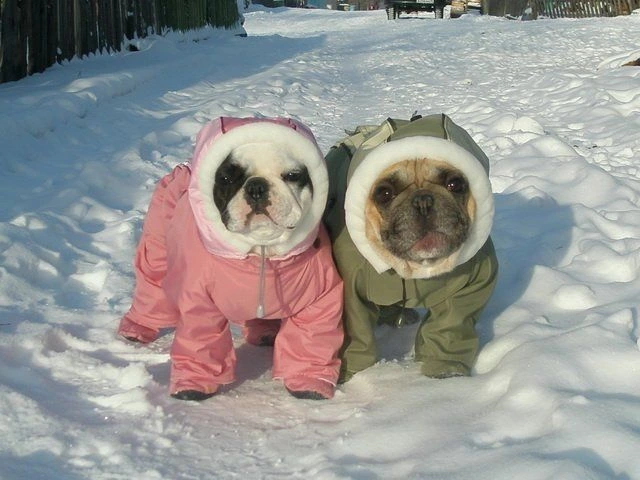Do Frenchies get cold in winter

As the winter season approaches, the well-being of French Bulldogs amid colder conditions takes precedence.
While these dogs often relish playing in the snow (watch video), prolonged exposure to cold temperatures can present challenges.
Compared to larger, long-haired breeds, smaller short-haired dogs, especially those of brachycephalic breeds, tend to feel the cold more intensely.
This prompts the question: what temperature is considered “too cold” for a French Bulldog? This inquiry led me on a quest to uncover the answer.
Quick answer :
At 4 degrees Celsius (40 degrees Fahrenheit), the cold can be too much for a French Bulldog, particularly for older dogs, young puppies, or those with health issues. When wet weather adds in, the risks of cold exposure become even higher.
Why French Bulldogs Struggle in Cold ?

Weather French Bulldogs do indeed feel the cold during winter.
Their sensitivity to chilly temperatures stems from their brachycephalic breed.
Due to this, their bodies tend to lose heat faster than it can be replenished, and their elongated soft palate can lead to breathing difficulties.
Additionally, their short coats offer minimal protection against the cold, leaving them vulnerable.
In essence, Frenchies aren’t inherently designed to thrive in outdoor environments.
These genetic traits also make them susceptible to discomfort in hot weather. Discover more about how to keep French Bulldogs cool in other sections of the blog.
Their susceptibility to cold weather leaves French Bulldogs prone to dehydration and hypothermia.
This breed requires extra care and attention during colder temperatures, necessitating a warm, cozy bed and a snug home environment above all else.
Signs Your French Bulldog is Cold
Recognizing when your French Bulldog is feeling the cold is crucial during chilly weather. Keep an eye out for these indicators:
- Refusal to Go Outside: If your Frenchie hesitates or avoids going out, it could signal discomfort with the cold.
- Nesting Behavior: Making a nest by tugging at blankets or burrowing in bed for warmth.
- Shivering: Visible shivers or trembling can indicate your Frenchie is feeling cold.
- Lethargy: Unusual tiredness or lack of energy could signify discomfort in colder temperatures.
- Lifting Paws Off the Ground: Lifting their paws while outside can suggest they’re feeling too cold.
- Vocalizations: Barking or whining more than usual can be a sign of discomfort due to cold.
In severe cases, French Bulldogs can suffer from hypothermia and frostbite. Hypothermia can lead to serious health issues like lack of blood circulation, muscle stiffness, kidney failure, and slowed heart rate. Look out for these signs:
- Shivering and Trembling
- Reduced Movement and Difficulty Walking
- Cold Skin and Fur
- Slowed Heart Rate
- Dilated Pupils
- Blue or Pale Gums and Inner Eyelids
- Breathing Difficulties
While these signs can be alarming, with proper care and attention during the colder months, it’s less likely your Frenchie will face such severe conditions.
Nevertheless, many French Bulldogs might exhibit milder symptoms of a cold. It’s not uncommon for them to develop minor illnesses. Below, you’ll find common cold symptoms to watch for and how to treat them if you suspect your Frenchie has caught a cold.

How Cold is Too Cold for a Frenchie?
If you’re unsure about what temperature is too cold for your French Bulldog, temperatures around 4 degrees Celsius (40 degrees Fahrenheit) can be uncomfortable for them.
Older or younger dogs and wet weather can increase the risks associated with these temperatures.
If you observe your Frenchie shivering or holding their paws off the ground, it’s a clear sign that the cold is too harsh for them to manage comfortably.
Best Ways to Ensure Your Frenchie’s Comfort in Cold Winter Weather!


Treating a Cold in French Bulldogs
Here are effective methods to address a cold in your French Bulldog, potentially averting more serious illness.
While I lack veterinary qualifications, a vet friend provided these trusted practices for managing a Frenchie’s cold symptoms.
-
Encourage Hydration:
Dehydration can be a concern in cold weather for Frenchies.Ensure your pup stays hydrated, even if they resist drinking when feeling unwell. -
To entice them, consider adding low-salt chicken broth to their water, helping to prevent further nasal congestion.
-
Boost Nutritional Intake:
Illness can cause a loss of appetite in your pup, risking their strength.Enhance their meals with nutritional additions like brown rice and boiled chicken, as advised by my vet.
-
Supplements for Recovery:
Consider adding supplements such as coconut oil, cinnamon, sweet potatos and honey to their food.These aids may improve their immune system and act as natural remedies for coughs, promoting a faster recovery.
-
Limit Outdoor Exposure and Encourage Rest:
Minimize your Frenchie’s time outdoors in cold weather, restricting it to short toilet breaks.
In severe cases, using puppy pads indoors might be advisable.
Ensure they rest adequately, reducing strenuous activities or playtime.
-
Provide Love and Comfort:
Shower your Frenchie with affection,Engage in socializing with your Frenchie, enveloping them in affection akin to the comforting care you craved when unwell as a child.Respect their space if they’re not receptive to cuddles -
Warmth Assistance:
If your Frenchie needs space but lacks warmth, try placing a warm (not hot) water bottle in their bed for comfort. The gentle warmth can aid in a swift recovery. -
Dog Nebulizer for Breathing Ease:
Nebulizers for dogs can ease breathing during a cold. Some owners swear by the AeroDawg nebulizer designed for smaller breeds.
Check reviews and user experiences for more insights.
-
Steam Vaporizer:
Like humans, steam vaporizers can clear bronchial tubes and relieve cold symptoms.
Position the vaporizer near your Frenchie’s bed for improved breathing.
-
Nose Balm for Comfort:
Protect your Frenchie’s nose from dryness or runniness in cold weather.
Consider using a high-quality organic nose balm like Snout Magic for relief.
When to Seek Veterinary Help: For serious symptoms or concerns about your Frenchie’s well-being, a vet visit becomes essential.
This is particularly crucial for puppies and older dogs with weaker immune systems, showing signs such as refusal of fluids, consistent pain, or chest rattling.
Remember, this advice serves as guidance and doesn’t replace professional veterinary care. Always prioritize your Frenchie’s health by seeking a vet’s opinion when in doubt or facing severe symptoms.

What Frenchies owner says :
We live in a cold region of canada and walk our Frenchie nearly daily even in the snow and cold. We put a coat on him and get him moving to keep him warm! We don’t take him if it’s below -15 (or just around the block) and have invested in games for him and play more inside when the weather is really bad.
My frenchie is fine even around -20 or more, he has shoes and a warm overall then.If -11 to -20 he has shoes on backpaws and a warm piece of clothing.-10 or warmer he dosnt really need anthing…
My Frenchy loves cold weather when it’s between 0-40F. He can walk 4-6 miles easy. Loves runny through snow, with no coat. Good Luck!
Frequently Asked Questions (FAQs)
Q1: How cold is too cold for a French Bulldog? Answer: French Bulldogs can start feeling uncomfortable around 4 degrees Celsius (40 degrees Fahrenheit). It’s especially crucial to monitor older or younger dogs, or during wet weather, as they may become more susceptible to the cold.
Q2: What are the signs that my Frenchie is feeling cold? Answer: Signs include reluctance to go outside, shivering, seeking warmth by nesting or staying close to heating sources, lifted paws, lethargy, increased vocalizations, or discomfort while outdoors.
Q3: What can I do to keep my Frenchie warm indoors? Answer: Ensure their bedding is away from drafts, use carpets to shield them from cold floors, provide warm blankets, limit exposure to cold windows and doors, and offer a cozy spot near a fireplace or use warm water bottles in their bed.
Q4: How can I protect my Frenchie’s paws during winter walks? Answer: Consider using winter doggie boots to shield their paws from cold, snow, and road salt. After walks, clean their paws to remove any residue that might irritate them.
Q5: Can French Bulldogs get sick from cold weather? Answer: Yes, cold weather can make Frenchies more susceptible to illnesses like colds, which might result in symptoms like coughing, sneezing, or nasal discharge. Taking preventive measures and providing proper care can help minimize the risks.
Q6: How should I adjust my Frenchie’s diet during the winter? Answer: Ensure they have a well-balanced diet and consider adding nutritional supplements or slightly increasing their food intake to help maintain their energy levels during colder months.
Q7: When should I seek veterinary help for my Frenchie’s cold? Answer: If your Frenchie displays severe symptoms like refusal to drink, consistent pain, prolonged lethargy, persistent coughing, or any other concerning signs, it’s advisable to consult a vet promptly.
Q8: Can French Bulldogs tolerate snow and outdoor activities in winter? Answer: While some Frenchies might enjoy brief outdoor activities in the snow, it’s crucial to monitor their behavior closely. Limit outdoor exposure to avoid discomfort or potential health issues from prolonged cold exposure.
Q9: How do I prevent my Frenchie’s nose from drying out in cold weather? Answer: Use a high-quality organic nose balm specifically designed for dogs to prevent dryness and discomfort in your Frenchie’s nose caused by cold weather conditions.
Q10: What’s the best way to ensure my Frenchie stays warm during car rides in winter? Answer: Preheat the car before taking your Frenchie for a ride, and avoid leaving them alone in a cold car. Keep the vehicle interior comfortably warm for them.

In essence,
As the winter chill sets in, prioritizing your French Bulldog’s well-being becomes paramount.
Understanding their sensitivity to colder temperatures and potential health risks is crucial in providing them with a cozy and safe environment during the colder months.
From recognizing signs of discomfort to implementing strategies such as creating warm indoor spaces, offering appropriate attire, and adjusting their care regimen, your efforts can significantly impact your Frenchie’s comfort and health.
You may also like :
Why my french bulldog eats poop? How to stop it ?
why are french bulldogs jealous




